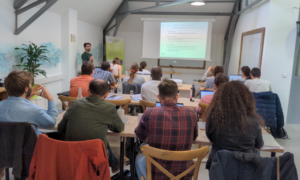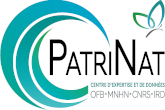Biodiversity knowledge synthesis: an introduction to meta-analyses and systematic reviews
This five-day course aims to train researchers on the methods and techniques of meta-analyses and systematic reviews/maps applied to the field of biodiversity

The CESAB – Centre for Biodiversity Synthesis and Analysis – of the FRB is offering the first edition of the following training course: “Biodiversity knowledge synthesis: an introduction to meta-analyses and systematic reviews“. This five-day course aims to train young researchers on the methods and techniques of meta-analyses and systematic reviews/maps applied to the field of biodiversity.
In addition, it will be an opportunity to become familiar with the various different tools available, both bibliographic (e.g., WOS; Zotero/Mendeley/Endnote) and statistical (R packages: metaDigisitise, metafor…), necessary for undertaking a review and meta-analysis.
The training course is given in French and takes place in the autumn at CESAB offices, in Montpellier. The price will be 250 € for the week – lunch included. Transportation, accommodation and evening meals are at the charge of the participants.

Find the training course on GitHub
Proficiency in R software is required but no experience in meta-analysis or systematic review is necessary.
- Damien BEILLOUIN (Cirad – Hortys)
- Jonathan BONFANTI (Inrae – Eco&Sols)
- Sylvie CAMPAGNE (Station biologique de Roscoff)
- Nicolas CASAJUS (FRB-Cesab)
- Joseph LANGRIDGE (FRB-Cesab)
- Dakis-Yaoba OUEDRAOGO (MNHN)
- Romain SORDELLO (MNHN)
Autre intervenant : Frédéric GOSSELIN.
Meta analyses and Systematic reviews are becoming more and more popular in the scientific literature. We need such approaches, especially in the field of ecology, because there is an ever-increasing number of studies looking at very similar questions, and frequently with contradictory/differing results. Indeed, it is very challenging for the average reader, clinician, manager, or even researcher to make sense of this mass of scientific literature without it being treated and synthesized in a meaningful way.
Historically, the application of meta-analysis first came from the field of medical research (Cochrane) designed to objectify decision making (medical treatments) through quantitatively synthesizing a large collection of results from individual studies. In ecology, there existed narrative reviews. They were often written by expert opinion leaders, but were done using non-systematic methods, and based on the research that is known to them, as opposed to the full spectrum of existing knowledge.
Today, the importance of using systematic methods to reduce bias in reviews of a body of evidence is somewhat distinguished as an issue separate from meta-analysis. Systematic reviews follow a standardized framework ensuring objectivity, comprehensiveness, transparency, and replicability to identify and synthesize the results of all relevant independent studies (for ecology, the reference association is the Collaboration for Environmental Evidence (CEE)). They are often considered the strongest form of scientific evidence synthesis because they minimize the different types of bias offering increased statistical power and robust results, which can help to resolve conflicting results across primary studies.
Monday 3 October 2022
- Welcoming participants and introduction to the week
- Introduction to knowledge synthesis
- The systematic review protocol
- Bibliographic databases (Web of Science, Scopus, Google Scholar)
- Formulation of the search equation (PECO/PICO approach)
- Constitution of the corpus (Zotero, Mendeley)
- Corpus cleaning (R package: revtools)
Tuesday 4 October 2022
- Article screening: systematic methods
- Article selection: eligibility criteria
- Metadata extraction
- Qualitative synthesis and data visualisation
Wednesday 5 October 2022
- Critical appraisal: understanding its importance in meta-analyses/systematic reviews, learn how to conduct one
- Introduction to meta-analytical approaches: how to calculate an effect-sizes; what are the different types of metrics e.g., hedges d/g or odd ratios (R package metaphor)
- Quantitative data extraction: what tools are available (R package: metaDigitise, plotdigitzer)
- Quantitative synthesis: visualizing the data e.g. forest plots, intervalles de confiances (R package : ggplot2)
- Risk of bias and interpretation of meta-analysis results
Thursday 6 October 2022
- Group projects: conducting a meta-analysis with your chosen methods
Friday 7 October 2022
- Restitution of the week: presentation of the results
